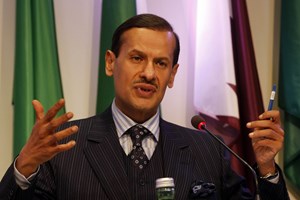Saudis urge restraint as OPEC+ meets on oil production hikes
(Bloomberg) --Saudi Arabia urged caution as OPEC+ gathered to discuss whether to hike supply again next month, with many countries wary of undermining a fragile recovery.
The kingdom highlighted the new risk to the oil market posed by a more infectious strain of the coronavirus, which has heightened the economic risks even as the roll-out of vaccines has buoyed prices.
“At the risk of being seen as a killjoy in the proceedings, I want to urge caution,” Saudi Energy Minister Prince Abdulaziz bin Salman said at the start of the group’s video conference on Monday. “The new variant of the virus is a worrying and unpredictable development.”
Russia, the cartel’s de-facto leader alongside Saudi Arabia, publicly backed an additional boost in late December. At the opening session of Monday’s meeting, Deputy Prime Minister Alexander Novak gave no clear signal about whether he is holding to that position. He highlighted the “healthier shape” of the market and the progress in vaccinations, but also warned of “uncertainties ahead.”
The Organization of Petroleum Exporting Countries and its allies must decide whether to add more barrels to the market. They are currently idling 7.2 million barrels a day, or about 7% of world supplies, and plan to return a further 1.5 million barrels a day in installments no larger than 500,000 barrels a day over the coming months.
The group is already taking a cautious approach, agreeing in December to meet every month -- rather than just a few times a year -- in order to fine-tune production levels more precisely and avoid capsizing the price recovery they spent most of 2020 working to achieve.
Talks between a panel of ministers that oversees the OPEC+ deal earlier on Monday concluded without a policy recommendation, leaving the decision to the full meeting of the entire group that’s now underway.
Other prominent voices from the alliance echoed Prince Abdulaziz’s caution. “There’s a need to be wary of the repercussions of the second wave of the pandemic,” state-run Kuwait News Agency reported on Monday, citing a statement from Oil Minister Mohammed Alfares.
OPEC Secretary-General Mohammad Barkindo said at Sunday’s preparatory meeting that “there are still many downside risks to juggle.”
Brent crude, the international benchmark, fell 1.1% to $51.23 a barrel as of 3:39 p.m. in London. Prices rallied earlier in the day on strong demand from Asia due to freezing weather, but faltered later amid signs of widening lockdowns in Europe.
The case for another small OPEC+ output increase in February is underpinned by a recovery in the oil prices, which have gained more than a third since the emergence of the first Covid vaccines last year.
The immunizations have created a “healthier” outlook for oil consumption, which will soon “shift from reverse to forward gear,” Barkindo said at the Joint Technical Committee meeting on Sunday. The panel assesses implementation on behalf of the 23-nation alliance.
Russia’s Novak signaled last month that he was ready to proceed, saying that prices are in an optimal range of $45 to $55 a barrel. If OPEC+ refrains from bolstering exports, its competitors will simply fill the gap, he said.
Gulf Allies
“The market has underlying support and as such should shrug off a modest increase in OPEC+ supply,” said Doug King, chief investment officer of the Merchant Commodity Fund, which manages $170 million.
It’s not just Russia that might favor opening the taps. Last month, OPEC+ talks ran into a five-day stalemate as Saudi Arabia and the United Arab Emirates -- for years stalwart allies in both political and energy spheres -- disagreed over how quickly to revive the idled barrels.
While the kingdom wanted to delay any increases for three months, its neighbor -- eager to monetize investments in capacity and promote a new regional oil benchmark -- pushed for a speedier timetable.
That might also come as a relief to OPEC+ members like Iraq. Baghdad is engulfed in a mounting economic crisis that is only exacerbated by limits on oil sales, and is struggling to get through a backlog of overdue output cuts from 2020.
Barkindo’s Caution
Yet there are also reasons to think the group will take a more cautious approach.
“We think the producer group will opt to forgo any further production increases for February with Covid-19 cases continuing to climb and the slower than expected vaccine roll-out,” said Helima Croft, chief commodities strategist at RBC Capital Markets LLC.
Restrictions on movement are still in place in a number of countries amid a new strain of the virus, Barkindo said. It’s too soon to know how key sectors of the economy will be affected, and for the tourism and leisure industries the return to pre-crisis levels could take a couple of years.
Oil inventories in developed nations remain 163 million barrels above their five-year average, Barkindo added. Despite the market’s rebound, crude prices are far below the levels most OPEC members need to cover government spending.
While the IEA anticipates no fresh surplus, it warned that the existing inventory overhang will linger to the end of the year if OPEC+ opens the taps.
Bob McNally, president of consultant Rapidan Energy Group and a former White House official, initially said to Bloomberg Television that the meeting was “a very close call.” He later changed that position, predicting OPEC+ would decide not to increase output in February.



